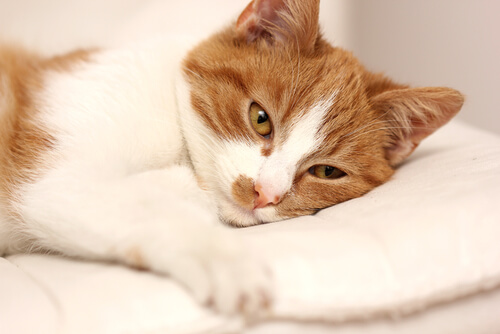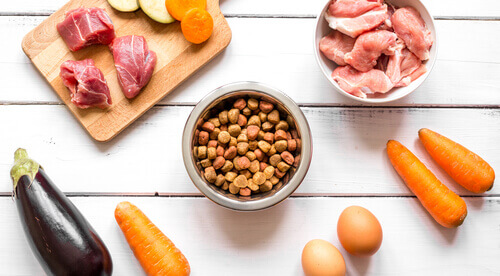The Importance of Taurine in Your Cat's Diet


Written and verified by the lawyer Francisco María García
Taurine in your cat’s diet is an essential nutrient. Its action in the feline body allows for the correct functioning of its cardiovascular and respiratory systems, as well as its vision and digestion. Below, we’ll talk a bit more about taurine and why it’s so important in the feline diet.
What is taurine?
Taurine is an essential amino acid that directly influences muscle structures and metabolism in mammals. It’s essential for good heart muscle dynamics, vision, and reproduction. In addition, it participates in the formation of bile salts, meaning it also intervenes in the digestive process.
Most of the amino acids combine in the body to form large chains of proteins. However, taurine appears as a free amino acid in the organic tissues of the eyes, heart, liver, etc.
The benefits of taurine in your cat’s diet
- Antioxidant action, which helps the organism fight against cellular aging and improve life expectancy
- Regulation of water and salt levels in the body’s cells
- Stimulation of metabolism and organic growth
- Production of bile salts
- Neurotransmitter action between the cells of the nervous system
- Positive participation in the cells of the retina
The importance of taurine
Unlike most mammals, cats aren’t capable of synthesizing taurine from other amino acids. Therefore, they must obtain this pre-synthesized nutrient from an external source. That is, cats must consume taurine in the meals that compose their daily diet.

A lack of taurine in your cat’s diet can cause a number of serious health problems. The absence of this amino acid is mainly related to blindness and different cardiovascular and respiratory pathologies. However, growth deficiencies and nervous disorders have also been diagnosed in cats with taurine deficiency.
Taurine-rich food for your cat
As we’ve mentioned, your cat’s diet should be rich in taurine to help it maintain excellent health. The indicated dosage is usually 200 to 300 milligrams for each daily intake of food. However, it’s essential to consult your veterinarian to confirm the ideal dose for your cat.
Taurine is an amino acid that animal proteins contain naturally. Commercial foods contain a certain amount of taurine, but must be of excellent quality (high range). These balanced foods present a mixture of high quality dehydrated meats and flours.
On the other hand, low-quality industrialized foods have very little animal protein. At the same time, they contain a large amount of flour from grains like corn, rice, or soybean. This not only results in an insufficient contribution of taurine, but also impairs an animal’s digestion and promotes the formation of gases.

Nutritional supplements
Ideally, you should meet your cat’s nutritional needs with natural and organic sources. Below, we’ll summarize the food with the highest content of taurine that you can incorporate into your cat’s diet:
- Beef: Beef and viscera are excellent sources of taurine. The highest doses of this amino acid come from the liver and heart of the cow. Remember that fat doesn’t contain taurine and is harmful when cats eat too much of it.
- Chicken: Darker and juicy meats, such as legs and viscera, have a higher concentration of taurine.
- Seafood: Clams and shrimps guarantee an excellent provision of taurine in our pet’s diet. In addition, they’re low in fat and their flavor will delight your cat.
- Eggs and dairy: Eggs, cheese, yogurts, and other dairy products are also natural sources of taurine. Please note that you should never give milk and high-fat cheeses to your pets.
It’s important to remember that taurine loses its properties when it’s exposed to high temperatures. Therefore, you should offer food to your pets that’s raw or minimally cooked in order to preserve their nutritional properties.
In everything that concerns your feline’s diet, it’s always necessary to acquire ingredients that you know are high-quality, and to wash them well before giving them to your cat.
This text is provided for informational purposes only and does not replace consultation with a professional. If in doubt, consult your specialist.